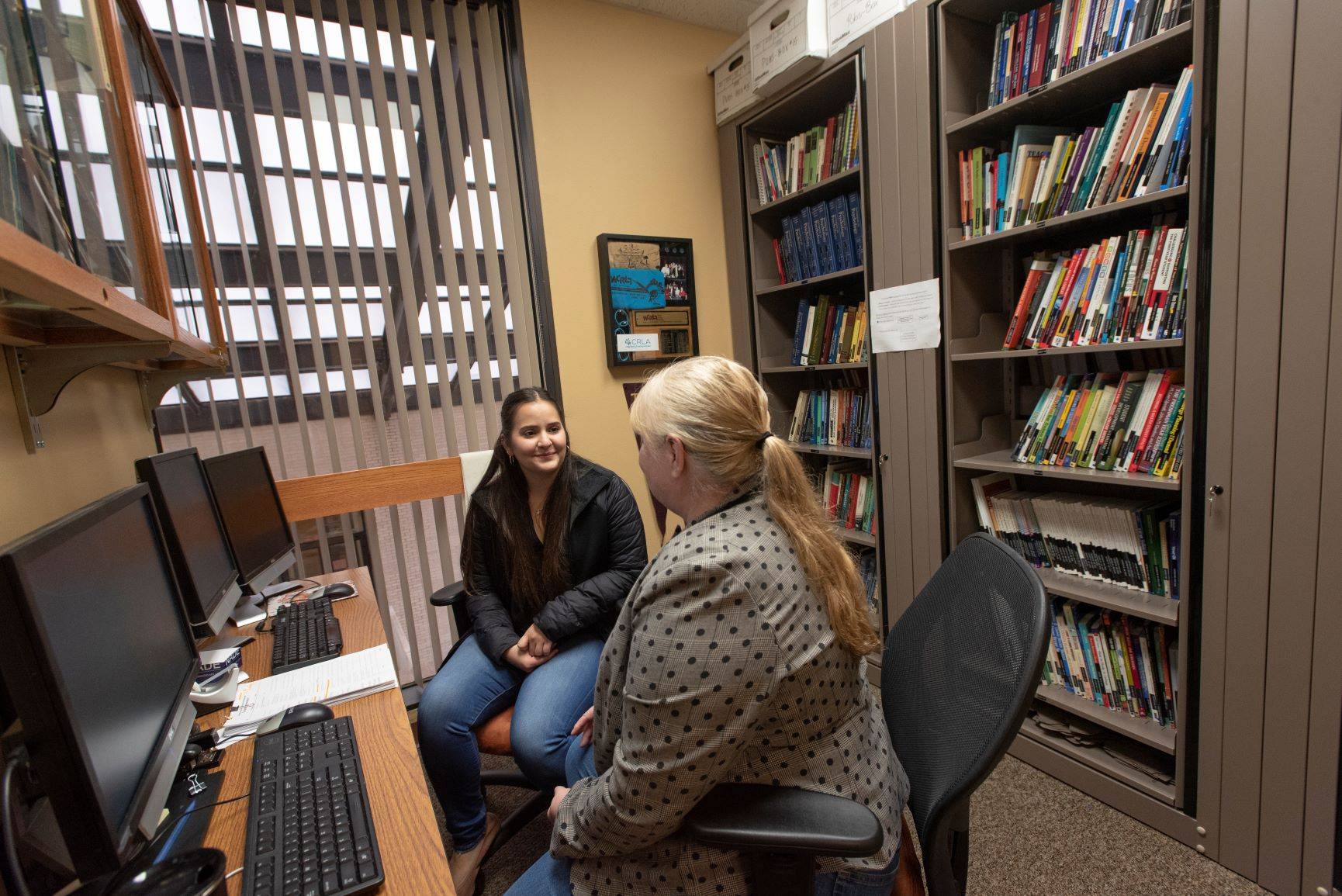Postsecondary Student Success in Learning, Literacy, and Mathematics (Ed.D./Ph.D.)
Ed.D/Ph.D Postsecondary Student Success (Doctoral)

Program Overview
As the first doctorate of philosophy (Ph.D.) and one of three doctorates of education (Ed.D.) programs in postsecondary student success in learning, literacy, and mathematics in the country, the program fills a crucial need for innovative research in a field that serves students underprepared for postsecondary education by valuing social, cultural and critical perspectives.
Course Work
The Ph.D. and the Ed.D. program requires 66 total credit hours consisting of:
- core courses grounded in developmental education theory and research
- research methodology courses
- specialization courses in the student's preferred concentration: developmental literacy, developmental mathematics or learning support
- dissertation courses
Students enter in cohorts each fall term. Full-time students typically take 9-10 hours each semester, and part-time students (with the exception of a one-year residency requirement) take 6-7 hours until they advance to candidacy.
| Degree | Concentration | Course Work | Dissertation | Total Hours | Location |
|---|---|---|---|---|---|
Degree Ed.D. | Concentration Developmental Literacy (for applicants with a bachelor's degree only) | Course Work 84 hours | Dissertation 12 hours | Total Hours 66 - 96 hours | Location San Marcos |
Degree Ph.D. | Concentration Developmental Literacy (for applicants with a bachelor's degree only) | Course Work 84 hours | Dissertation 12 hours | Total Hours 66 - 96 hours | Location San Marcos |
Degree Ed.D. | Concentration Developmental Mathematics (for applicants with a bachelor's degree only) | Course Work 84 hours | Dissertation 12 hours | Total Hours 66 - 96 hours | Location San Marcos |
Degree Ph.D. | Concentration Developmental Mathematics (for applicants with a bachelor's degree only) | Course Work 84 hours | Dissertation 12 hours | Total Hours 66 - 96 hours | Location San Marcos |
Degree Ed.D. | Concentration Learning Support (for applicants with a bachelor's degree only) | Course Work 84 hours | Dissertation 12 hours | Total Hours 66 - 96 hours | Location San Marcos |
Degree Ph.D. | Concentration Learning Support (for applicants with a bachelor's degree only) | Course Work 84 hours | Dissertation 12 hours | Total Hours 66 - 96 hours | Location San Marcos |
Degree Ed.D. | Concentration Developmental Literacy | Course Work 54 hours | Dissertation 12 hours | Total Hours 66 hours | Location San Marcos |
Degree Ph.D. | Concentration Developmental Literacy | Course Work 54 hours | Dissertation 12 hours | Total Hours 66 hours | Location San Marcos |
Degree Ed.D. | Concentration Developmental Mathematics | Course Work 54 hours | Dissertation 12 hours | Total Hours 66 hours | Location San Marcos |
Degree Ph.D. | Concentration Developmental Mathematics | Course Work 54 hours | Dissertation 12 hours | Total Hours 66 hours | Location San Marcos |
Degree Ed.D. | Concentration Learning Support | Course Work 54 hours | Dissertation 12 hours | Total Hours 66 hours | Location San Marcos |
Degree Ph.D. | Concentration Learning Support | Course Work 54 hours | Dissertation 12 hours | Total Hours 66 hours | Location San Marcos |
Program Details
Doctoral students are frequently recognized for their research and scholarship. They win awards, fellowships and scholarships and present papers at regional and national conferences.
Program Mission
The doctoral program in postsecondary student success in learning, literacy, and mathematics prepares future scholars, researchers, leaders, administrators, instructors and practitioners in the field of developmental education.
Both rigorous and supportive, the program aims to advance theory, research and practice in multiple areas of developmental education - including developmental literacy, developmental mathematics and learning support - by actively engaging students in teaching, scholarship and professional service. In this multidisciplinary program, the faculty, staff and students work collaboratively across various academic disciplines, diverse communities and geographic boundaries.
Career Options
The doctoral program prepares graduates for a wide variety of careers. The Ph.D. is designed for students planning careers as researchers, faculty and scholars who will build a strong research and theoretical base for developmental education. The Ed.D. is designed for students planning careers as highly qualified program leaders, policymakers, researchers and practitioners who will advance developmental education in a variety of contexts.
Program Faculty
Faculty research interests include:
- theoretical and applied issues of student motivation, emotion, learning strategies and self-regulation
- strategic college reading and the role of technology in supporting strategic reading
- postsecondary student success courses
- demographic changes in higher education and effective instruction with culturally and linguistically diverse learners
- college transitional readers' deliberate and
non-deliberate responses to texts and conceptualizations of literacy - the impact of professional development on instruction in the adult student transition to postsecondary literacy
- educational equity for youth and the intersections of formal and informal cultures in education
Contact us for general questions about your application, funding opportunities, and more. If you have specific questions after reviewing the program details, contact the program's graduate advisor.
Doctoral Program Director
Dr. Taylor Acee
ta19@txstate.edu
512.245.7903
Academic Services Building North (ASBN), Room 401C
Advisor Support
Dena Guerrero
d_g322@txstate.edu
512.245.6839
Academic Services Building North (ASBN), Room 401

Apply Now Already know that Texas State is right for you?
Application Deadlines
| Deadlines | U.S. Citizen | International |
|---|---|---|
Deadlines Fall - Priority | U.S. Citizen January 15 | International January 15 |
Deadlines Fall - Standard | U.S. Citizen March 31 | International March 31 |
This program's deadline is firm. This type of deadline means the application and other application requirements must be submitted by the program's specified deadline day.
|
|
Funding Information Applications must be complete by the priority deadline to be considered for certain types of funding. |
|
|
Decision Timeline This program reviews applications on a firm basis. |
Admission Requirements
The items required for admission consideration are listed below. Additional information for applicants with international credentials can be found on our international web pages.
-
Application
- Completed online application
Review important information about the online application.
-
Application Fee
- $55 Nonrefundable application fee, OR
- $90 Nonrefundable application fee for applications with international credentials
Review important information about application fees.
-
Transcripts & GPA
- baccalaureate degree from a regionally accredited university (Non-U.S. degrees must be equivalent to a four-year U.S. Bachelor’s degree. In most cases, three-year degrees are not considered. Visit our International FAQs for more information.)
- master's degree from a regionally accredited university or demonstrated success in graduate-level studies or professional experience in a field relevant to developmental education* (Non-U.S. degrees must be equivalent to a U.S. Master’s degree. Master’s degrees following a three-year Bachelor’s degrees may not be equivalent; please contact Graduate Admissions if you are unsure.)
- a copy of an official transcript from each institution where course credit was granted
- minimum 3.0 GPA (on a 4.0 scale) in all completed graduate course work
*The developmental education doctorate (both Ph.D. and Ed.D. tracks) requires 96 semester credit hours for students admitted with a bachelor's degree. Students admitted with a bachelor’s degree will follow the same program of study as students admitted with a master’s degree (66 semester credit hours) but with an additional 30 semester credit hours of open electives.
Review important information about transcripts. Official transcripts, sent directly from your institution, will be required if admission is granted.
-
Test Scores
GRE
- GRE not required
Approved English Proficiency Exam Scores
Applicants are required to submit an approved English proficiency exam score that meets the minimum program requirements below unless they have earned a bachelor’s degree or higher from a regionally accredited U.S. institution or the equivalent from a country on our exempt countries list.
- official TOEFL iBT scores required with a 78 overall
- official PTE scores required with a 52 overall
- official IELTS (academic) scores required with a 6.5 overall and
- minimum individual module scores of 6.0
- official Duolingo scores required with a 110 overall
- official TOEFL Essentials scores required with an 8.5 overall
This program does not offer admission if the scores above are not met.
Review important information about official test scores.
-
Documents & Other Requirements
- resume/CV
- statement of purpose (approximately 500-1000 words) demonstrating your research interest and goals as a developmental education professional and your potential to contribute to the advancement of scholarly work in the field of developmental education. A discussion of your relevant teaching, research, and/or policy experience should be included as well as clear evidence of your commitment to research and scholarship.
- three letters of recommendation addressing your professional and academic background
- interviews with the admissions committee will be arranged (following the initial screening using the admissions criteria) for qualified applicants
Review important information about documents.